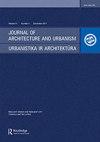分裂的大脑和构建世界的方式:伊恩-麦吉尔克里斯特和克里斯托弗-亚历山大思想中的相似之处
IF 0.8
0 ARCHITECTURE
引用次数: 0
摘要
是什么导致了 20 世纪建筑环境的根本性变化?战后重建、城市化、工业化、风格转变或社会政治变革等因素肯定与此有关,但更深层次的影响可能与人类大脑的结构和动态有关。伊恩-麦吉尔克里斯特(Iain McGilchrist)的 "半球假说 "提出,左右半球之间的差异并不是功能性的,而是体现了对世界的截然相反的态度:左半球看到的是一个原子化的世界,它是由为了生存而需要控制和操纵的事物组成的;而右半球看到的是一个相互关联的整体世界,它与这个整体有着深刻的联系。麦吉尔克里斯特注意到,近几个世纪以来,西方越来越倾向于左半球的方法。克里斯托弗-亚历山大(Christopher Alexander)毕生追求建筑世界的整体性,这与麦克吉尔赫里斯特应用于建筑领域的观点不谋而合。亚历山大观察到,当今的建筑环境是我们的文明将世界视为一个由各个部分组成的巨大机制,而不是一个不可分割的整体的体现。作为回应,亚历山大开发了将世界视为一个统一整体的设计方法,并将新场所的建设视为该整体的进一步展开。本文章由计算机程序翻译,如有差异,请以英文原文为准。
THE DIVIDED BRAIN AND WAYS OF BUILDING THE WORLD: PARALLELS IN THE THOUGHT OF IAIN MCGILCHRIST AND CHRISTOPHER ALEXANDER
What might have led to the fundamental changes in the built environment during the 20th century? While factors such as postwar reconstruction, urbanization, industrialization, shifts in style, or socio-political changes are surely involved, there may be deeper influences that are associated with the structure and dynamics of the human brain. Iain McGilchrist’s hemisphere hypothesis proposes that the differences between the left and right hemispheres are not functional but embody opposing approaches to the world: the left sees an atomized world made of things to be controlled and manipulated for survival; the right sees an interconnected world of wholes with which it is deeply related. McGilchrist observes that in recent centuries, there has been an increasing shift in the West towards the left hemisphere’s approach. Christopher Alexander’s lifelong quest for wholeness in the built world resonates with McGilchrist’s observations as applied to the field of architecture. Alexander observed that today’s built environment is an expression of our civilization seeing the world as a giant mechanism made of parts rather than an indivisible whole. In response, Alexander developed design methods that approach the world as a unified whole and the building of new places as a further unfolding of that whole.
求助全文
通过发布文献求助,成功后即可免费获取论文全文。
去求助
来源期刊

Journal of Architecture and Urbanism
ARCHITECTURE-
CiteScore
1.30
自引率
14.30%
发文量
12
审稿时长
15 weeks
期刊介绍:
The Journal of Architecture and Urbanism publishes original research on all aspects of urban architecture.
 求助内容:
求助内容: 应助结果提醒方式:
应助结果提醒方式:


